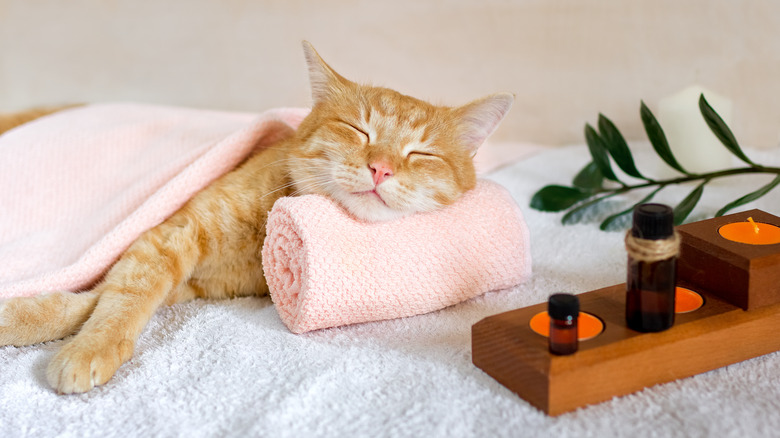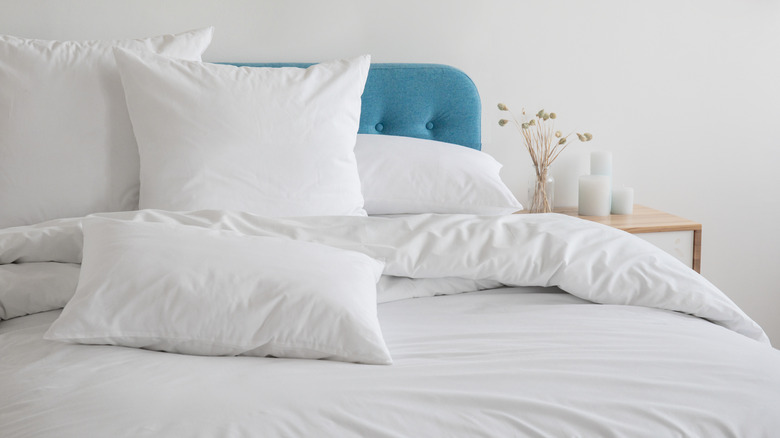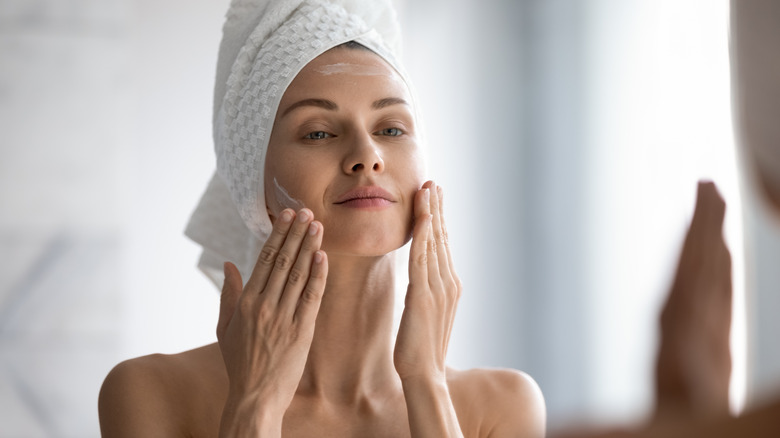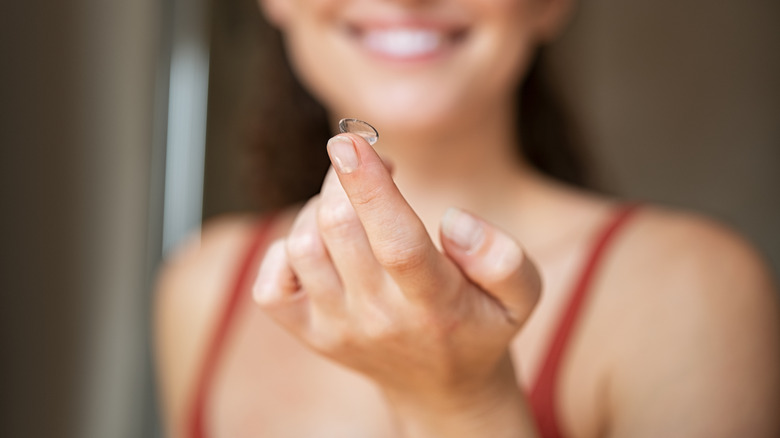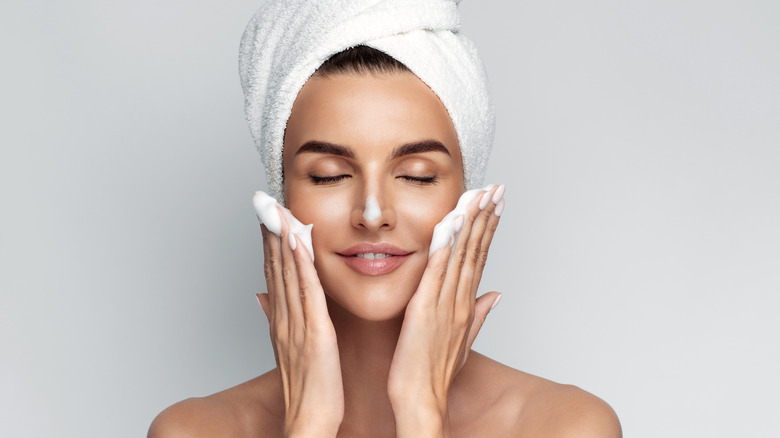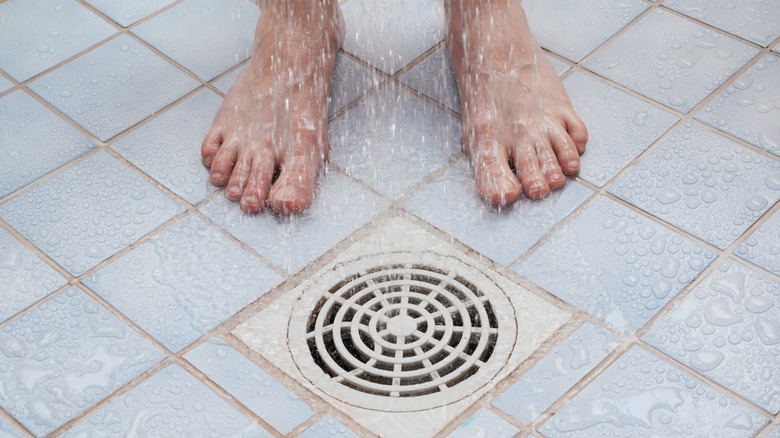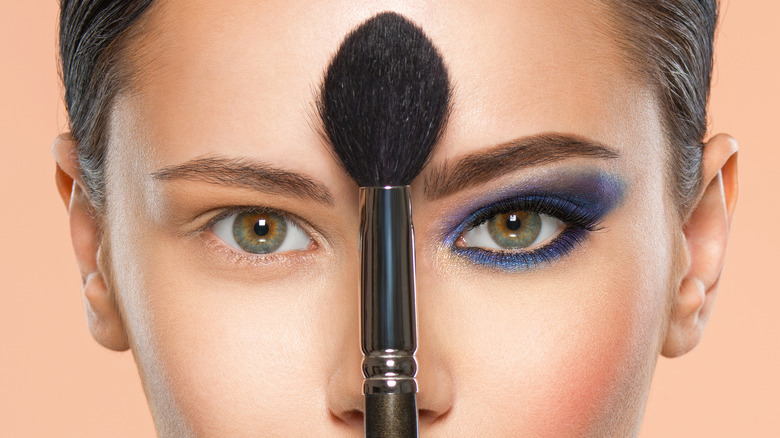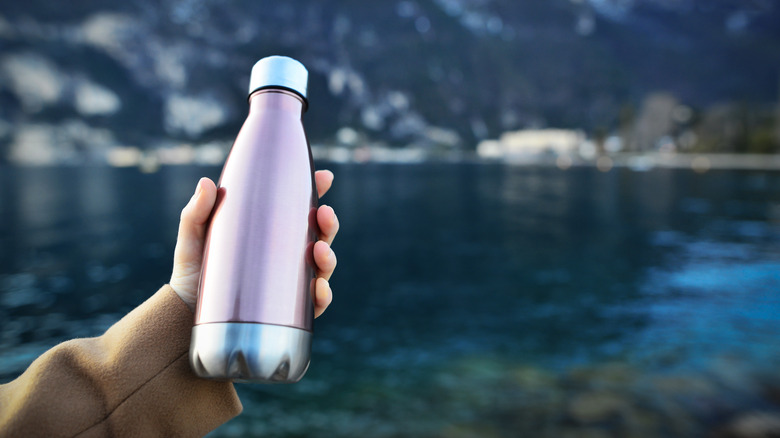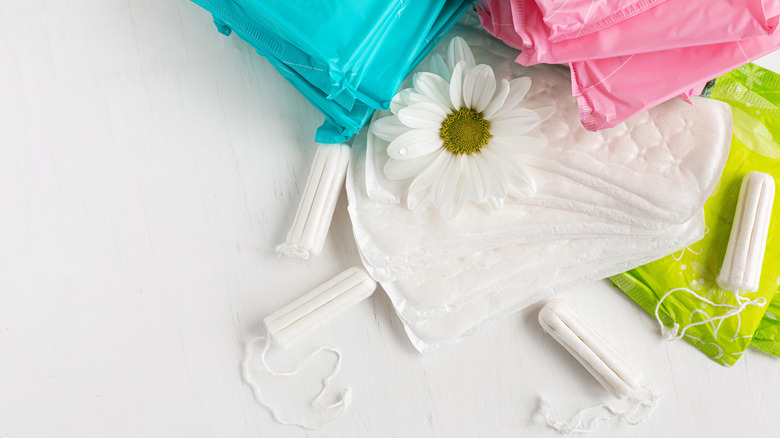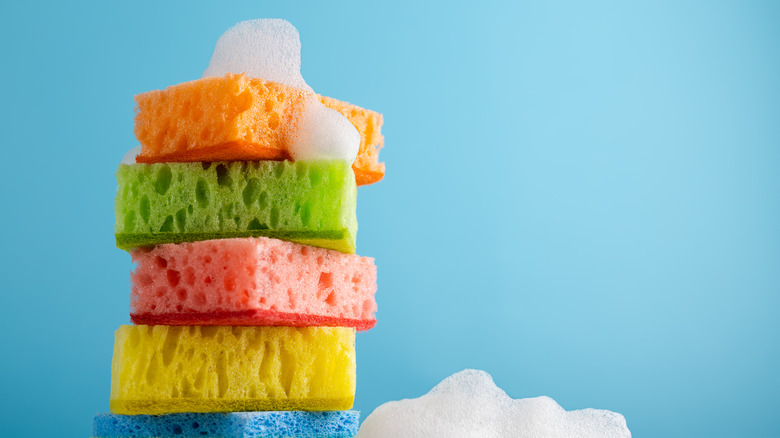Hygiene Mistakes You Didn't Know You Were Making
While personal hygiene has varying degrees of importance to all of us, we can all usually agree that some level of hygiene is irrevocably necessary. Activities like brushing your teeth, washing your hands after using the bathroom, and laundering your underwear after wearing them should be second nature. But did you know that even these basic hygiene tasks can be performed incorrectly?
Most hygiene practices are incredibly important because they help keep the internal and external body clean and healthy (via Medical News Today). Bacteria is lurking all around us. It is on our skin, on the surfaces we touch, and inside of our bodies. Many of the elements of basic personal hygiene relate to bacteria management. We want to ensure we have enough in the right areas, but not too much in others. For example, the balance of bacteria within the vagina is crucial to maintain for overall well-being (via Cleveland Clinic). Conversely, failing to wash your feet while you're in the shower could lead to an overgrowth of bacteria that can have health repercussions (via Eat This, Not That!). Hygiene is also important because it can help prevent us from introducing harmful bacteria, viruses, and other pathogens to our internal ecosystems, thereby preserving our health and overall happiness (via The Center for Hyperhidrosis).
Since so many hygienic maneuvers can be performed wrong, it is important to know what they are. Let's take a look at some of the most common hygiene mistakes, some that you might not even know that you're making.
You don't wash your bedding often enough
Admittedly, changing your bedding often can be a hard task to keep up on. This might be especially true if one side of your bed is up against a wall — so hard to get that fitted sheet down in there, ugh! However, neglecting this chore could lead to health issues. The good news is that you don't have to wash your sheets too often; experts recommend laundering your bedding once per week, according to Self.
So what, might you ask, are the negative effects of skipping this chore week after week? Well, they are gross, that is for sure. For one thing, dust mites and fungus are given the opportunity to proliferate under unclean conditions, which can aggravate allergies (via The Healthy and Mayo Clinic). Bedsheets that haven't been washed for a while can also become a breeding ground for bacteria that comes off of your body or pajamas. Not only can this cause more minor problems like skin irritation or acne (per Self), but The Healthy points out that in extreme cases, unwashed bedding and clothing can lead to staph infections. Staph infections, if left untreated, can work their way into the bloodstream and potentially cause fatalities.
Armed with this knowledge, it seems like an early New Years' resolution should now be set in motion. We will definitely be washing our bedding weekly from this moment on — we hope the same for you!
You use too much lotion
Using too much lotion seems more likely to create an oil slick in your bathtub than hygiene issues, but unfortunately, over-indulging in your favorite lotions might actually be creating an imbalance within your skin. If you end up over-moisturizing, your body may respond by slowing its oil production over the long-term. This may ultimately lead to drier skin (via Well + Good)! That's a catch-22 if we've ever heard one.
Some of the signs of over-moisturizing include blackheads, clogged pores, and increased oil production. Your skin functions as a barrier, and by over-moisturizing, you are essentially causing this barrier to weaken (via Teen Vogue). So by over-doing it with the slippery stuff, no matter how delicious it smells, you might leave you stripped of your natural oils, but with an abundance of artificial ones. This can result in dry and more acne-prone skin, which is far from what we assume your ultimate goal is. When it doubt, moisturize responsibly to maintain balance on the surface of your body's largest, most impressive organ.
You sleep with your contacts in
We've all gotten home late and felt too exhausted to go through the rigamarole of proper hygiene before bed. But if you wear them, it is valuable to remember just how important it is to remove contacts before catching those zzzs. Ophthalmologist and eye surgeon Dr. Alan Mendelsohn reported to The Healthy that not swapping out your contacts or washing them is as gross as wearing the same dirty underwear everyday, ew!
Dr. Mendelsohn states that wearing contacts for a week or longer exponentially increases your risk of developing severe eye infections. One of the ailments that you will become more susceptible to is corneal ulcers. That translates to an open sore on the protective, outer layer of your eyeball. While eye infections can vary in severity, in extreme cases of corneal ulcers, patients might require corneal transplants. All of this can be avoided by switching out your contacts daily, making sure they stay clean, and washing your hands before putting your fingers in your eyes. We bet you'll think twice before passing out with your contacts in from here on out.
You bite your nails
You may know from experience that biting your nails is an incredibly hard habit to break — and also one that everyone who doesn't do it constantly tells you is repulsive, so kind. But truly, nail biting is incredibly problematic for hygiene reasons, which is pretty predictable. But the repercussions of nail biting aren't as straightforward as just introducing a plethora of bacteria into your system (via Insider). It is true that tons of germs live beneath your fingernails, including but not limited to the frightening E. coli. But the consequences of nail biting are much wider reaching.
Your teeth and gums are not designed to handle the type of stress that gnawing on your nails inflicts. Nail biting can result in gum recession and fissures in the teeth, which can essentially negate the efforts of costly orthodontia. Beyond that — as if we need another reason — is that if you bite down too hard on your nail and remove a huge chunk, you could set the scene for infections. Ingrown nails can become a huge issue for nail biters, in addition to an increased risk of developing warts caused by HPV.
In case the threat of warts, dental problems, infections, and of E. coli in your mouth are not enough, nail biters are more prone to bad breath than non-nail biters. Not only can the germs living beneath your nails cause gut problems, but they can wreak havoc inside your mouth as well.
You don't wash your hands after you use the restroom
We tend to think that this nugget of hygiene advice is well-known, but it is a pretty big one so it's always worth a little reminder, don't you think? According to Health, "Not washing your hands after you poop is more dangerous than eating raw meat," which is an incredibly aggressive statement. But the truth is, it is really bad to not wash your hands after you poop. Not washing your hands after your poop is a fantastic way to spread drug-resistant E. coli, both to yourself and to other people. There are many different types of E. coli, but the one that was specifically examined in a study published in the Lancet Infectious Disease Journal is present within the intestines of humans. While it can be harmless, some strains of E. coli can cause symptoms similar to those of food poisoning, urinary tract infections, and even blood infections.
The best way to prevent the spread of harmful E. coli is by washing your hands thoroughly with soap and water for at least 20 seconds after using the restroom and before handling food, whether it is for yourself or for someone else (via Health). Like we said, we assume that everyone is up to snuff on this bit of hygienic info, but a little refresher course never hurt anyone.
You wash your underwear in cold water
Underwear preferences are personal — however, the hygiene practices that should go into caring for your chonies, and subsequently your body, are universal. Washing our filthy, skin-hugging materials in cold water is yet another hygiene mistake that many of us didn't know we were making (via Well + Good). And you guessed it, it all circles back to one thing — the ever-present bacteria.
We are probably all on board with changing out our underwear daily since they can accumulate urine, vaginal discharge, dirt, and fecal mater, which in turn can cause itchy skin and infections. In fact, changing our underwear on the reg is likely one of the first hygiene practices that come to mind when the words "personal hygiene" are uttered. The problem is that if you wash them in cold water, the bacteria you're trying to evict can actually survive the wash cycle. This is true even if you use enough soap! Experts agree that in order to wash away bacteria and truly have fresh underoos, the water in which you wash them needs to reach at least 80 degrees Fahrenheit, and you must use an adequate amount of high-quality detergent. By washing your skivvies in warm to hot water, you'll be avoiding one common underwear mistake and a whole lot of bacteria overgrowth.
You don't floss
Flossing is often viewed as a habit that can be skirted around every so often, but skipping inter-dental cleaning could spell trouble when it comes to hygiene. When you neglect to floss your teeth, the tartar that accumulates can harden into plaque, which is unsightly and can lead to further health complications (via Crest). Cavities are essentially born of the bacteria on the surfaces of your teeth drilling holes into the enamel.
Furthermore, neglecting your chompers could cause other diseases as well. Periodontal disease, or an infection of the gums, has been linked to heart disease (via The Healthy). Researchers suggest a link between increased systemic bacteria and poor oral hygiene as well. Small abrasions on your teeth or gums could potentially allow bacteria or harmful pathogens to enter your bloodstream, making you highly susceptible to further infections.
Much of this risk can be mitigated by flossing. Of course, other oral hygiene habits such as brushing and drinking lots of water will help too. Engaging in daily flossing is one hygiene habit that you'll no longer want to skip.
You exfoliate every day
Every so often, a good exfoliating scrub on the cheeks (either set) leaves your skin feeling refreshed and as good as new. It turns out, though, that over-exfoliating is a common hygiene mistake that you might be making (via Healthline). The main sign of over-exfoliation is redness and irritation. After enough time and intense, rough scrubbing, small abrasions can be created on the surface of the skin. Not only do these small cuts detract from your natural glow, too much exfoliation could cause your capillaries — the small, uber-thin veins that live beneath the surface of the skin – to break. And while this isn't necessarily harmful to your health, it can cause spider veins to emerge (via Healthline).
Tight and dry skin, acne, flaky skin, and excessive oil production are other signs that you've taken this hygiene habit a little too far (per Glamour). In addition to compromising your skin's natural luminosity and homeostasis, over-exfoliating can affect the integrity of your skin as a barrier. While this is not the biggest hygiene mistake you could be making by far, it is certainly one worth dialing in so you don't have to endure the negative effects.
You don't wash your feet
It should come as no surprise to you that your feet are teeming with bacteria (via Self). If you're like us, you probably thought that allowing the soap and water from your shower to run over your feet was enough to rid your flippers of little bugs. Not so. Unfortunately, not washing your feet is a hygiene mistake that many people make. The repercussions are not exactly harmful, but they can be off-putting and downright stinky.
Bacteria feeds on waste products that are produced by out sweat glands, Robert K. Lee, chief of podiatric foot and ankle surgery at UCLA Medical Center, said in an interview with Self. As these waste products are eaten up, the bacteria can begin to produce odors — this is what causes stinky feet and, obviously, armpits. The best way to combat this hygiene faux pas is to use soap and scrub the tops, sides, and soles of your feet when you shower. Feet also come into contact with a lot of surfaces and can pick up infection-causing bacteria and fungi. From avoiding painful rashes to proudly kicking your shoes off when it's time to Netflix and chill, washing your feet is one hygiene habit that we should all keep in our routines.
You go to bed with your makeup on
Flopping into bed at the end of a long day with your makeup still on is a habit that is hard to break. At the end of an arduous day, the last thing that sounds good is waiting for the water to warm up while you argue with your bulletproof mascara. But, as it turns out, the health of your skin hangs in the balance of performing this less-than-enticing task on the daily.
Leaving your makeup caked onto your face is an excellent way to ensure that you end up with clogged pores and experience the emergence of blackheads and acne (per The Healthy). Failing to wash your makeup off can even lead to patchy changes in the color of your skin, because it changes the way the skin cells grow.
You might be thinking that since you don't wear foundation or "face" makeup that you're in the clear and can keep crashing with your eye makeup on — nope. Your mascara and other eye makeup can harbor bacteria (we are sure you saw this coming), and when it isn't removed properly, it can migrate into your peepers. Once it's there, it can lead to styes, inflammation, and further skin infections. In extreme cases, these consequences can parlay into blindness. So, do yourself a favor and wash that makeup off before bed, period.
You don't wash your reusable water bottle often enough
Not washing your reusable water bottle enough is actually really disgusting. We were under the impression that bacteria couldn't live on stainless steel, but oh how wrong we were. Stainless steel bottles are the safest bet for keeping your bottle clean-adjacent, but they definitely are not impenetrable by any means. According to USA Today, water bottles that go even a few days between washings can harbor bacteria and, most-horrifyingly, poop particles, ack! It doesn't seem to matter what material your bottle is made out of — when it is unwashed, it becomes a safe haven in which bacteria can thrive. That said, some bottles, such as slide-top bottles, tend to host the most bacteria.
Bacteria gets introduced to your bottle in a few different ways. The most common is by way of your hands. Say, for example, that you're holding your phone, which you've probably heard likely has fecal matter on it. This fecal matter can latch onto your hands, and then to your bottle as your reach it open it; it is as simple as that. Bacteria can also grow in the backwash at the bottom, though the germs that came from your own mouth aren't likely to cause any harm. This becomes more of a hygiene issue if you opt to share your bottle with someone else. And we assure you, that is not the fun way to get mono.
You leave tampons in for too long
Most women have probably been told that leaving tampons in for too long can have fatal effects by way of Toxic Shock Syndrome (TSS). However, it seems like we have been a bit misled. TSS is caused by an overgrowth of staph infection bacteria, the likes of which can be found on many surfaces of your skin (via Forbes). TSS is scary and life-threatening for sure, but it is also incredibly rare. It affects about 1 in every 100,000 people annually, which is to say that it does not afflict every single woman who leaves a tampon in for one minute beyond eight hours.
The bigger issue with leaving tampons in for too long is abnormal discharge and the potential for a foul odor to emerge. Tampons are essentially plugs that catch the flow of menstrual blood, but they also influence the way your vagina is able to clean itself (via Multi-Gyn). Over-wearing tampons could lead to slight pH imbalances, irritation, and other vaginal issues. So, while TSS may not be the most likely occurrence of wearing tampons for too long, there are other hygiene consequences, so it is best to stay on top of changing them.
You don't wash your produce
In a twist that surprises no one, we learned that unwashed produce can also harbor — BACTERIA! This is why it is so important to douse those fresh fruits and veggies before indulging (per The Healthy), which is exactly what it feels like we are doing every time we eat a Honeycrisp apple. Seriously, bacteria that lives on the surfaces of these nature-grown goodies can give you food poisoning. In case that bit of information doesn't motivate you to give your fresh foods a scrub down, perhaps knowing that consuming surface pesticides will. In the less severe cases, pesticide ingestion has been linked to diarrhea and, surprisingly, insomnia. But in more severe cases, consuming residual pesticides on the surfaces of these foods can potentially lead to increased heart rate, respiratory illness, loss of reflexes, lack of consciousness, and sometimes death. Since death is on the line here, even though it's rare, we definitely think that you should take a few extra minutes to bathe your fruits and veggies.
You don't replace your kitchen sponge often enough
Another hygiene mistake that you might be making takes place in your kitchen sink. Kitchen sponges that aren't replaced every few weeks can spread E. coli, salmonella, and SARS-CoV-2, which is the virus that causes COVID-19. One study found that kitchen sponges are the most bacteria-riddled thing in your house (via Scientific Reports). That's right, kitchen sponges are home to more bacteria than your toilet seat, ew! The researchers conducting the study found there to be around 5.5 trillion microscopic bugs on each used sponge, with bacteria being the most abundant.
It is recommended that we replace our sponges every week or so in order to cut down on the proliferation of bacteria and the generalized spreading of viruses and other bugs, which happens when you wipe your counters and other surfaces with them (via The Healthy). If you want to clean your sponge, you can do so by sending it through a wash cycle in your washing machine, though you'll need to be intentional about it. If you choose to go this route, you'll want to wash your sponge with heavy-duty, bleach-containing detergent, and ensure that the water is at least 140 degrees Fahrenheit.

